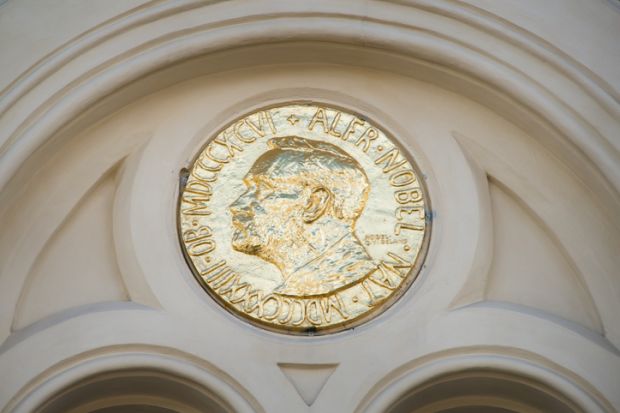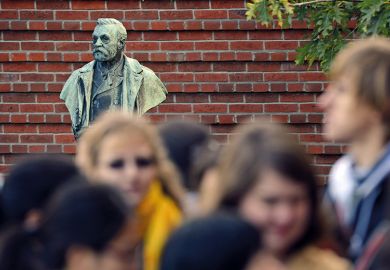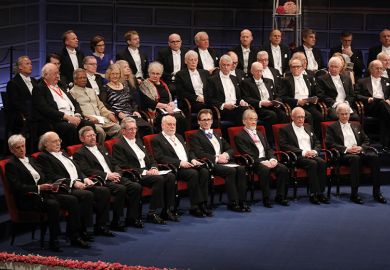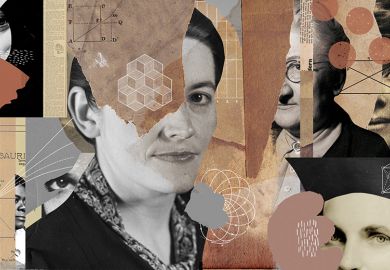The family of a celebrated US poet is seeking to overturn a rule that prevents Nobel prizes from being awarded posthumously.
Weeks after Remains of the Day author Kazuo Ishiguro was awarded the 2017 Nobel Prize for Literature, the granddaughter of William Carlos Williams told Times Higher Education that she is exploring how the Pulitzer prizewinning poet might be considered for next year’s award.
Daphne Williams-Fox, who is compiling a new collection of the New Jersey poet’s unpublished work, said that she intends to appeal against the Nobel Foundation’s rule that prohibits prizes from going to those who have died.
The award can be bestowed on a deceased person only if they were nominated by a Nobel committee in the year prior to their death, which allowed Canadian immunologist Ralph Steinman to share the 2011 prize for medicine just days after his death. This would not apply in the US poet’s case as he died in 1963.
Any change in the rules could potentially open the door to honouring several figures in other disciplines who were overlooked for a Nobel.
Many scientists believe that Rosalind Franklin was unfairly denied credit for her work on the discovery of the structure of DNA because she died in 1958, four years before the Nobel Prize was awarded to Francis Crick and James Watson. Several other female scientists should also merit a Nobel prize, such as German chemist Erika Cremer and Austrian physicist Marietta Blau, as the true impact of their research was not known until after their deaths, critics have argued. Meanwhile, Indian leader Mahatma Gandhi was unable to win the peace prize after his assassination in 1948.
A shift towards awarding prizes posthumously might have allowed the Nobel Foundation to avoid the current embarrassment associated with the 1991 prize awarded to Aung San Suu Kyi, who is accused of ignoring atrocities in her native Myanmar this year. It would also have stopped the 1926 medicine award going to Danish scientist Johannes Fibiger, whose supposed discovery of a cancer-causing roundworm was later proved to be false.
Dr Williams-Fox argued that it is time to abolish the ban on posthumous Nobels as her grandfather’s poetry is “still alive in people’s hearts”. The writer, who was also a paediatric physician, has attracted a growing following after his writings played a central part in the acclaimed 2016 film Paterson, which starred Star Wars actor Adam Driver as a poetry-writing bus driver, she said.
“I think this is the moment when history needs to change,” Dr Williams-Fox told THE. “People who know Dr Williams’ work think about him on a daily basis – they love him, particularly in New Jersey, where he is a really big figure for us.”
Dr Williams’ “huge body of work” spanning almost six decades and a substantial amount of material soon to be published should lead to a change to the rules and his consideration by the Nobel committee, she added.
Changing the rule would allow the Nobel committee to assess the prize on genuine literary merit, rather than be restricted by a rule that made little sense for literature, Dr Williams-Fox added.
The literature prize has faced criticism for honouring several obscure Scandinavian writers or minor Mediterranean poets, while overlooking literary giants such as Leo Tolstoy and Franz Kafka, who was ineligible for contention as his work was only published posthumously.
“It’s wrong to also see a hugely influential figure like my grandfather not considered,” said Dr Williams-Fox.
Posthumous consideration would also correct an injustice as Dr Williams’ candidacy for a Nobel prize was possibly overlooked due to unfounded McCarthyite allegations of communism that cast a shadow on his later life, she added.
However, Sir Richard J. Roberts, the English biochemist who won the 1993 physiology prize, said that the Nobel Foundation’s wishes in this matter “should be respected”.
“It could lead to a lot of problems,” Sir Richard told THE, adding that “you could imagine the recipients all being dead, which might not be good for the ceremony”.
Register to continue
Why register?
- Registration is free and only takes a moment
- Once registered, you can read 3 articles a month
- Sign up for our newsletter
Subscribe
Or subscribe for unlimited access to:
- Unlimited access to news, views, insights & reviews
- Digital editions
- Digital access to THE’s university and college rankings analysis
Already registered or a current subscriber?








